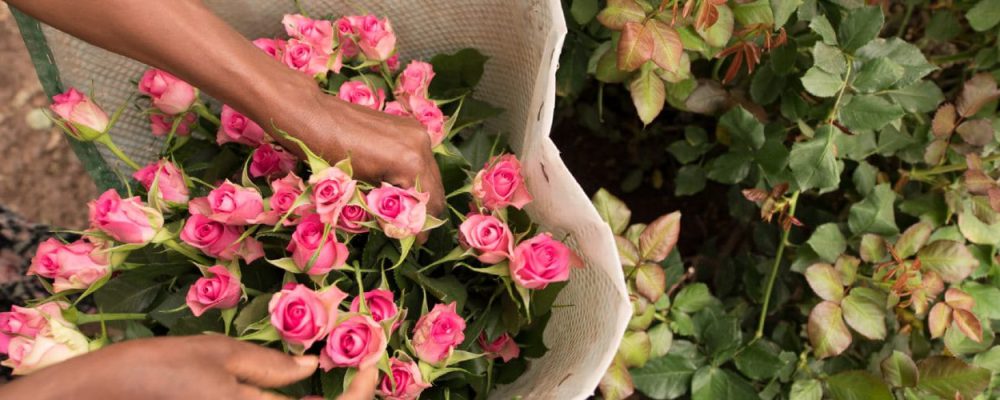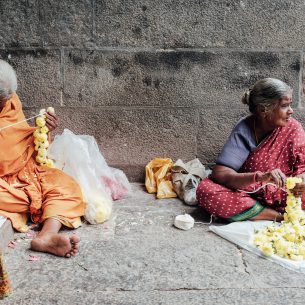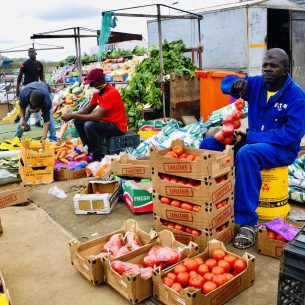
High food prices and loss of income have emerged as the major concerns for women working on flower farms in Kenya. A rapid assessment of the effects of COVID-19 by Hivos East Africa Women@Work indicates that food security is a major concern mainly due to job losses and increasing food prices.
The analysis further shows that whereas vegetable and fruit farms enjoy a steady workload and consistent orders (hence hardly any job losses), flower farms have seen their workforce reduced by 50 percent. The other half of staff has been either sent home on unpaid leave, or made to work on rotation basis and do twice the work. The horticulture sector in Kenya is thus probably one of the worst hit by the coronavirus pandemic. It is Kenya’s third largest foreign exchange earner, and last year alone contributed KES 120 billion to the country’s gross domestic product. But now it is at less than 10 percent of its normal operations.
In one of the farms sampled there was a significant reduction of workers from 500 to 180, with close to 100 permanent workers being among those sent on unpaid leave. Additionally, on only four out of 12 farms sampled have employers retained their entire workforce as the effects of COVID-19 rage on. For some of these farms, the decision to retain workers was the result of dialogue between company management and the Kenya Plantation and Agricultural Workers Union (KPAWU). They agreed on a rotational schedule of two weeks of paid work and two weeks of unpaid leave.
Marginalization of women
Doing more work for less pay (reported in eight of the 12 farms sampled) has led to an increase in the number of employees off sick, with women reporting higher fatigue and stress levels as they live in constant fear of termination. “I feel tormented both mentally and physically. It is like life has turned upside down. I am doing more than double the work I used to do. And yet when I go back home, my children need my full attention,” said one of the interviewees.
Further, patriarchal insistence on maintaining gender roles has compounded the marginalization of women. The obligation to do domestic chores, child care and homeschooling is leaving women overwhelmed and frustrated. A majority of workers interviewed (83 percent) reported an increase in care-work, tension at work and a sense of financial inadequacy. This combination is straining women’s family relations as they find themselves too exhausted to properly engage after a hard day’s work. Domestic violence is a clear risk for them.
Positive Outlook
Key industry players in the supply chain, Fairtrade and Waitrose Foundation, have committed to support workers with monthly cash payments and food packages, respectively, to cushion them from the current hardship. The money will be drawn from the Fairtrade premium (a communal fund for workers and farmers*) from May 2020 for an unspecified period of time.
Some farms have expanded the sorting area and hired extra buses to transport workers in compliance with social distancing measures. One of the farms has introduced night shifts to deal with the dusk to dawn curfew for its packing workers. It also emerged that one company had introduced a variety of breeds on their farms in order to reach new markets.
Way Forward
The fate of hundreds of workers sent home on unpaid leave in March and April 2020 remains unclear. The study recommends expanding COVID-19 social safety net programs for vulnerable workers who have lost their jobs. Or for those in low income and precarious employment, such as the horticulture sector.
The government needs to regulate the prices of food and other essential goods to ensure increases are only triggered by normal supply and demand forces, not price manipulation.
Thirdly, the government should urgently roll out mass testing for the horticultural and other densely populated sectors. This should include free personal protective equipment; free quarantine services for those who have tested positive and free healthcare for workers who fall ill, irrespective of their employment terms.
Further, the government should also ensure standardization of sanitation equipment to prevent employers from purchasing substandard materials that may further expose workers to contracting the coronavirus.
* The Fairtrade Premium is an extra sum of money paid on top of the selling price, which farmers or workers invest in projects of their choice.








